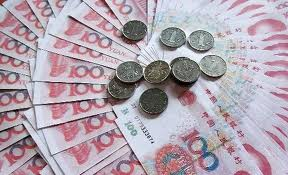Broader fields for renminbi
- By Zhang Monan
 0 Comment(s)
0 Comment(s) Print
Print E-mail China Daily, April 28, 2012
E-mail China Daily, April 28, 2012
|
|
|
[File Photo] |
As more places introduce new bonds, settlement in yuan has to apply to trading of energy and other bulk goods
China's currency has recently shown signs of accelerated steps toward internationalization, as indicated by HSBC's recent launch of the first RMB-denominated bond in London, the first offshore RMB business beyond Hong Kong, and an agreement the World Bank signed with China's central bank for entrusted investment in the country's inter-bank bonds market.
Earlier in late February, the People's Bank of China said in a report that conditions are basically matured for the country to step up opening its capital accounts, a stance that demonstrates that China's central bank is prepared for internationalization of the yuan.
Internationalization of a country's currency should be based upon a solid resource foundation. What the yuan badly needs to accelerate its internationalization is its resources and the function in pricing energy products. Currently, the yuan is seldom used in the import and export settlement of different countries, global bulk commodity transactions and at international capital market, indicating it has a long way to go before internationalization.
Internationalization of the yuan will play a critical role in promoting China's transformation from a purely trading giant to a trade and financial power. Past practices show that, to become a key international currency, a country usually has to experience the changed status of its currency from a pricing and settlement currency to a reserve and anchor currency, as indicated by the evolved status of the pound in the 19th century and the US dollar in the 20th century.
The current world trade of bulk commodities, from oil and gold to nonferrous metal and agricultural products is almost all denominated in the US dollar, either in cash, futures or in derivatives market, either in WTI or in Brent. The establishment of the "oil dollar" trade settlement mechanism has made oil suppliers unable to ultimately set prices. The pegging of the dollar to oil has also endowed the United States with a strong oil pricing power, which has helped Washington to net huge profits from international oil trade.
The volume of "oil dollars" being circulated at the international market ranges from $1.4 trillion to $1.8 trillion, statistics show. However, a large portion of the amount has flown back to the US Securities and national debt markets, filling in its huge trade and fiscal deficits and helping strike a balance between its current account deficit and capital account surplus.
The dollar's role of measurement at international oil and other energy trade has also produced significant influence on the economic effects of oil exporters because of fluctuations of its exchange rate. The yuan's fluctuated exchange rate to the US dollar, together with floating oil prices, has also increased huge costs on China's oil imports.
Statistics show that China's crude oil imports increased by 6 percent in 2011, but its expenditures increased as much as 45.3 percent, as the result of its weak say in international crude oil pricing and the yuan's considerable appreciation against the US dollar. The yuan has risen 5.11 percent to the greenback in value since the start of 2012.
Over the past decade, China's demands on some bulk commodities have been on a steady rise. According to a recent survey conducted by Greatwall Strategy Consultant, a famous domestic consultancy company, the volumes of China's consumption of 19 bulk commodities rank as the highest in the world.
For example, its consumption of iron ores, rare earth and coal respectively account for 68 percent, 67 percent and 48 percent of the world total. Due to their lack of a say in the pricing process, China and other Asian nations have to pay a higher cost than the US and European countries, which is the so-called Asian Premium. This, if not changed, will pose a growing threat to China's energy security as the country increasingly depends on foreign energy supply in the future.
According to a report issued by the China Energy Research Society in December 2011, China's energy dependence on the outside increased from 8.8 percent in 2008 to 15 percent in 2011. Such dependence has increased to 60 percent and 30 percent for the country's oil and natural gas. The percentages will only increase further in the future.
China's ever-growing energy dependence highlights the necessity of establishing a yuan-denominated international energy pricing system. This is an inevitable path for the rise of the yuan's status in international energy trade. It is also a crucial step toward the yuan's internationalization.
As a step toward this target, China can negotiate with African, Middle Eastern and Southeast Asian nations for an increased use of its currency for the settlement of energy, minerals and grains trade. The country should also promote the yuan's use in project contracting, labor export and outbound international assistance in a bid to increase its international reputation.
The offshore markets of Hong Kong or London are far from enough to realize internationalization of the yuan. A larger ground, such as in the field of energy and other bulk commodities, is needed to facilitate this process. Only an increased proportion of yuan-denominated settlement in global trade can maintain a lasting international demand on China's currency, which is a solid foundation for its internationalization.
The author is an economics researcher with the State Information Center.






